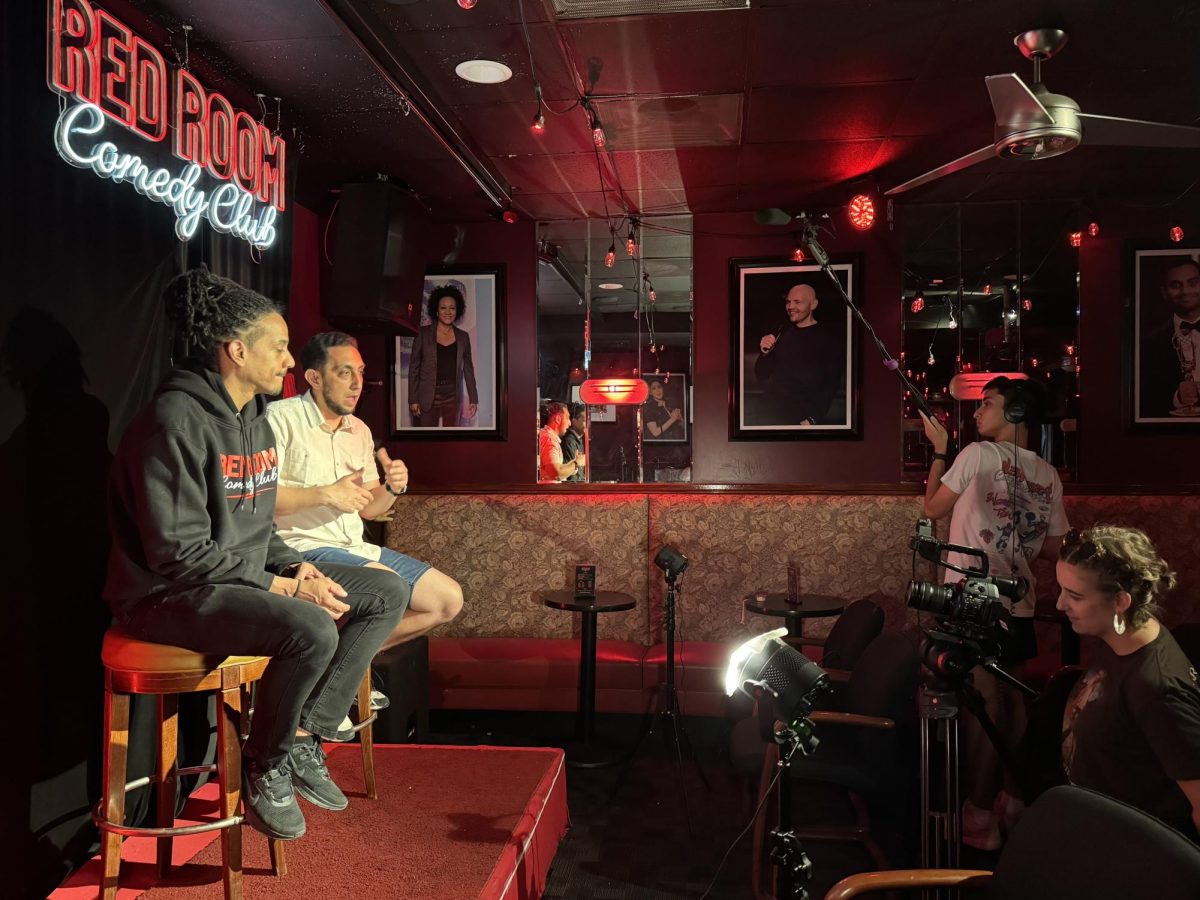SESP Prof. Sepehr Vakil first saw Chicago-based comedian Mike Knight perform at the Red Room Comedy Club in Rogers Park two years ago.
Vakil said after he attended several of Knight’s shows, they developed mutual interests in each other’s professions.
“Peanut butter and jelly, ever since,” Knight said.
Knight brought Vakil onto his “Real R.A.P. Podcast” as a guest, and Vakil invited Knight to speak in his Culture and Cognition class.
They later returned to the Red Room to film a promotional video for their joint podcast, “A Professor and Comedian Walk Into a Bar,” which launched July 2024.
Over seven episodes, the podcast has covered topics including Chicago politics, artificial intelligence’s effect on education, student activism and the 2024 presidential election.
Each interview features both a guest professor and comedian. The most recent episode includes Boston University Prof. Saida Grundy and comedian Clark Jones discussing race and immigration.
Medill junior Sandra Salib is on a team of Northwestern undergraduates helping produce the podcast.
“Mike is hilarious. Sepehr is very intellectual,” Salib said. “Seeing their dynamic is so funny because Mike will tease Sepehr, and Sepehr will just not know what to say back.”
While the two may seem like opposites, Knight views their relationship as complementary. He likens them to notable entertainment duos like Abbott and Costello, as well as Penn and Teller.
Both hosts said they realized comedy and college overlapped more than they expected. Knight said professors and comics both make audiences consider new ideas. For him, the main distinction was financial.
“We hold court and try to captivate people’s attention with information,” Knight said. “Normally, people don’t have to get a loan to come see one of my shows, so there are subtle differences.”
They also share an affinity for listening to others’ stories. Knight said this was one reason that drew him to podcasting. For Vakil, his affinity for spoken word storytelling led to an interest in comedy.
As a UCLA undergraduate, Vakil discovered the Da Poetry Lounge, which hosted open mic nights on Tuesdays. Participants ranged from high schoolers to adults in their 50s, he said, and their vulnerability struck him.
“It’s very similar to the courage it takes to get up and try to be funny in front of strangers,” Vakil said.
Around the time of the Oct. 7th Hamas attack on Israel, Vakil visited his friends in Los Angeles. Like he did on previous trips, he went to see a show at The Comedy Store.
As always, stand-ups spoke about the news, which at that time focused on the Israel-Hamas war. They took sides, Vakil said. Some jokes landed. Others induced tension and awkwardness.
Vakil said he remembered that particular show for the way comedians and the audience welcomed discomfort. When he thought about fellow professors avoiding discussion of the conflict, he said he felt disappointed.
“Deliberating around really tough issues is exactly what we should be doing more of in higher ed,” Vakil said. “But that culture, currently, I don’t think exists.”
He said the podcast’s discussion of political issues aims to fill that gap.
Communication senior PJ Fahrenkrug, another student intern, said working on the project showed them comedy’s potential as a vehicle for social justice.
“As someone who wants to be a comedian, it’s been cool to see that this is a field that can actually have an impact,” Fahrenkrug said.
Comedians and professors both perform written material, often touching upon controversial topics, Vakil said. But comedy makes information more accessible to the general public. He said even paying for a stand-up showcase costs less than that for attending a play.
While academics tend to present their views as superior to others’, Vakil said he admires the way comedians base their acts on their flaws and mistakes.
“It’s like democracy,” Vakil said. “It’s everybody, different cultures (and) different socioeconomic backgrounds. That gives the medium of comedy a level of authenticity and down to earthness that we don’t have in higher ed.”
Email: desireeluo2028@u.northwestern.edu
Related Stories:
— McCormick Prof. Elizabeth Gerber hosts podcast to share stories of female tech leaders, designers






